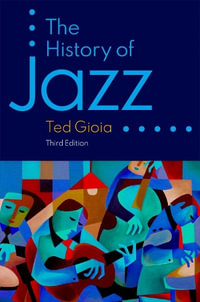Keith Jarrett ranks among the most accomplished and influential pianists in jazz history. His The Koln Concert stands among the most important jazz recordings of the past four decades, not only because of the music on the record, but also because of the remarkable reception it has received from musicians and lay-listeners alike. Since the album's 1975 release, it has sold over three million copies: a remarkable achievement for any jazz record, but an unprecedented feat for a two-disc set of solo piano performances featuring no well-known songs.
In Keith Jarrett's The Koln Concert, author Peter Elsdon seeks to uncover what it is about this recording, about Keith Jarrett's performance, that elicits such success. Recognizing The Koln Concert as a multi-faceted text, Elsdon engages with it musically, culturally, aesthetically, and historically in order to understand the concert and album as a means through which Jarrett articulated his own cultural and musical outlook, and establish himself as a serious artist. Through these explorations of the concert as text, of the recording and of the live performance, Keith Jarrett's The Koln Concert fills a major hole in jazz scholarship, and is essential reading for jazz scholars and musicians alike, as well as Keith Jarrett's many fans.
Industry Reviews
"Elsdon analyzes the music, and he presents the public afterlife of the album. Therefore, the careful reader should have at hand a copy of the album and, if possible, the Jarrett-authorized notated transcription, published as Keith Jarrett, The Köln Concert: Original Transcription... The endnotes, bibliography, and discography enhance the use as a handbook for all readers, whether newcomers or experienced listeners wearing out their fifth or sixth
copies of the album." --Notes, Journal of the Music Library Association
"In this outstanding study, Peter Elsdon provides fresh insights into the creation, marketing, and reception of Keith Jarrett's most famous album. Even more valuable, the book sheds new light on the processes and functions of musical improvisation, composition, recording, and listening as a whole. Smart, readable, and engaging from start to finish, Eldon's work is a must for anyone interested in the making and meaning of jazz since the 1970s." --David Ake,
jazz pianist, musicologist, and Director of the School of the Arts at the University of Nevada, Reno
"Elsdon's authoritative and thought-provoking study of Jarrett's famous Köln Concert is not merely the first substantial investigation of a seminally important recording: throughout his perceptive musical analyses and insightful cultural and historical contextualization, the author persuasively addresses fundamental questions about the nature of improvisation, the phenomenon of musical performance, and the significance of the recorded artifact."
--Mervyn Cooke, Professor of Music, University of Nottingham
"Elsdon's musical knowledge and passion for his subject is beyond question...An informative, enthusiastic and thoughtprovoking book about what might be the definitive
hour in Keith Jarrett's musical life." --The New York City Jazz Record
"Demonstrates an excellent level of scholarship and an excellent resource for knowledgeable readers...Recommended." --Choice
"The endnotes, bibliography, and discography enhance the use as a handbook for all readers, whether newcomers or experienced listeners wearing out their fifth or sixth copies of the album." --otes
"Elsdon adopts a more inclusive approach and uses a range of research methods to call attention to the complexities of performance, production, and reception of The Köln Concert. ... Elsdon's text is also compelling for his analysis of Jarrett's vexed attitudes towards his own album, particularly as it relates to the pianist's aesthetic and artistic goals for his improvised solo piano concerts, of which the Köln concert was just
one."--Twentieth-Century Music
























